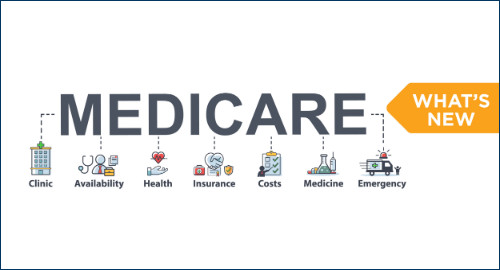10 myths about Medicare Advantage – busted!
As you approach your 65th birthday, or if you are already enrolled in Medicare, either your Initial Coverage Election Period (ICEP) or the upcoming Annual Election Period (AEP) are important times for you. Everyone has their thoughts on Medicare and which coverage is best. Advice from friends, family and neighbors is great, but when it comes to your healthcare, the choice is based on you and your needs. Here are ten common myths about Medicare Advantage that we’d like to bust (or at least just dive into a little deeper).
Myth #1: If you enroll in a Medicare Advantage plan, you no longer have Medicare
Medicare Advantage is also known as Part C, and it is just another way to receive Medicare coverage. You receive your Part A and Part B benefits from a private health insurance company instead of the federal government, and you also receive additional supplemental benefits.
Myth #2: Medicare Advantage plans and Medicare supplemental plans (MedSupp, Medigap) are the same
These are two different types of plans, and you cannot have both Medicare Advantage and MedSupp coverage. Medigap plans fill in coverage gaps in Original Medicare. Generally, they have higher monthly premiums than HMO or HMO-POS Medicare Advantage plans, but you can see any doctor who accepts Medicare. With a Medigap plan, you will need to purchase a separate prescription drug plan (Part D) if you want prescription drug coverage. We go into more detail in a previous blog post.
Myth #3: Medicare Advantage plans are too expensive
With Original Medicare (Parts A and B), there are some copays, deductibles and outpatient doctor visits and services that are not covered. There is also no out-of-pocket maximum. In order to fill the coverage gap, Medicare beneficiaries look to purchase supplemental insurance coverage (Medigap) or enroll in a Medicare Advantage plan instead. There are several types of Medicare Advantage plans available, with different premiums, co-pays and deductibles. Plans also have a yearly cap on enrollees’ out-of-pocket costs for medical care. Once you reach this limit, you’ll pay nothing for covered services. Visit our plans & rates page for more information.
Myth #4: Medicare Advantage plans force you to see a small group of providers
Standards for provider networks are set by the federal government. While Medicare Advantage HMO and HMO-POS plans have a panel of providers from which to choose from and you are expected to use, in most cases, it is about coordinating and personalizing your care. Over 700 doctors, many other healthcare providers and all four Monterey County hospitals are part of the Aspire Health Plan network.
Myth #5: Medicare Advantage plans are only for seniors who have excellent health
Original Medicare can’t reject you because you’re sick or have a pre-existing condition. Medicare Advantage plans are not allowed to deny coverage based on health status. MA plans also offer care coordination and disease management, which can help those living with chronic conditions. Also, starting in 2021, all eligible beneficiaries with end stage renal disease (ESRD) can now enroll in a Medicare Advantage plan.
Myth #6: All Medicare Advantage plans are the same
The most significant differences between Medicare Advantage plans are based on provider networks, prescription drug coverage and premiums (and extra benefits that are bundled into plans). Plan sponsors like Aspire Health Plan also offer different plan options that can best meet your needs. If you are interested in enrolling in a Medicare Advantage plan, you will need to do some plan comparisons to determine which plan best meets your needs and preferences.
Myth #7: Medicare Advantage plans can make changes to your healthcare coverage without telling you
Each year, prior to the start of Open Enrollment (October 15 – December 7), Medicare Advantage plans contact enrollees about changes in their MA plan through the Annual Notice of Change (ANOC), which details the changes in plan benefits for the following year. Aspire Health Plan members can contact us directly with any questions by calling (855) 570-1600, TTY users call 711.
Myth #8: When choosing a Medicare Advantage plan with Part D coverage (MAPD), drug lists and drug costs are not readily available
Most Medicare Advantage plans offer Part D coverage in a combined policy known as an MAPD plan. When searching for an MAPD plan, you can use Medicare’s Plan Finder tool, or you can contact a specific plan to find out if the prescriptions that you need are included on their drug list. There is also an Extra Help program to help pay drug program costs, like premiums, deductibles and coinsurance.
Myth #9: Medicare Advantage plans do not offer dental, vision or hearing coverage
Original Medicare does not offer vision, hearing or dental benefits. Most Medicare Advantage plans offer these benefits. In addition, Medicare Advantage plans are now allowed to add additional benefits that are not included in regular Medicare including transportation, chiropractic, acupuncture and fitness options.
Myth #10: Once you enroll in a Medicare Advantage plan, you cannot change your coverage
Every year, you can switch plans during the Annual Election Period (AEP) or return to Original Medicare. You may also qualify for a Special Enrollment Period (SEP) if you move into, out of or reside in a skilled nursing facility (SNF) or long-term care (LTC) hospital or if you move out of a geographic area. We talk about this more in a previous blog post.
Of course, it’s worth noting that if you like your current Medicare coverage, you can always stick with it. If you are happy with your Medicare Advantage Plan, your coverage will renew for the upcoming plan year.
Get a free Medicare Plan Comparison Guide to learn more about your options.
H8764_MKT_MAmyths_Blog_0920_C











Hi Lynn, Thank you sending explanation on the difference in Med Sups & Medicare Advantage Plans. So many of the Advantage Plans are advertising 0 premiums & 0 deductibles & etc. There is a reason for this as you know. Thanks again
[…] is a common myth that provider networks for Medicare Advantage plans are small, meaning that options for PCPs are […]
Thanks for informing me that Medicare plans can still be approved even if you have pre-existing health conditions. My dad is turning 70 this year, so I’m planning on getting him a much-needed health plan for seniors. I’ve heard that there are also supplementary plans on top of basic Medicare plans so I’m going to look into those to see if my dad has the need to have those as well.
I appreciate you explaining to us how Medicare Advantage is just another way to receive Medicare and additional supplemental benefits. My grandmother is almost 65, so we were thinking of enrolling her in a Medicare plan. I’ll have to look for a certified Medicare advisor to help with the process.